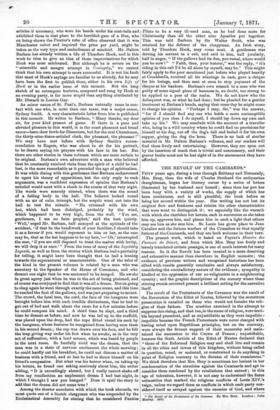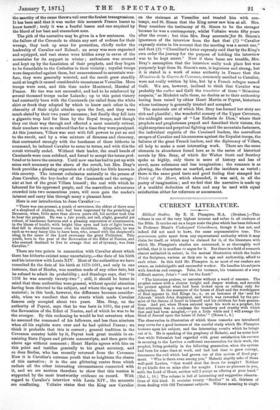THE REVOLT OF THE CAMISARDS.* Fwry years ago, during a
tour through Brittany and Normandy, Mrs. Bray, then the wife of Charles Stothard the antiquariarr draughtsman, began her literary career by a series of letters illustrated by her husband and herself ; since then her pen has been busy with a variety of works, the supply of which has been continuous, and is still plentiful, the book before us being her second within the year. Her writing has not lost its original flow and freshness and retains the other characteristics that were wont to distinguish it ; we especially like the warmth with which she cherishes her heroes, each in succession as she takes him up, approves him, and places him in such a light that others may see him as she sees him. St. Louis has given place to Jean Cavalier and the furious warfare of the Crusaders to that equally furious of the Camisards, and they are both welcome in their turn.
The present work, which is based on Peyrat's Histoire des Pasteurs du Desert, and from which Mrs. Bray has freely and tersely translated certain passages, is one of much interest for many reasons. In it the Revolt has been treated in a more deserving and exhaustive manner than elsewhere in English memoirs ; the evidence of previous writers and recognised historians has been sifted with results generally conclusive and always satisfactory, considering the contradictory nature of the evidence ; sympathy is kindled at the oppression of our co-religionists in a neighbouring country ; and the graphic descriptions of the scenery where these stirring events occurred present a brilliant setting for the narrative itself.
The revolt of the Protestants of the Cevennes was the result of the Revocation of the Edict of Nantes, followed by the monstrous persecution it entailed on those who would not forsake the reli- gion of their fathers. The cruelties exercised in the attempt to suppress this rising, and that too, in the name of religion, were terri- ble beyond precedent, and as unjustifiable as they were impolitic :- impolitic because the French Protestants were never charged with having acted upon Republican principles, but on the contrary, were always the firmest support of their monarchy and main- tained the succession to the Crown of France ; unjustifiable, because the Sixth Article of the Edict of Nantes declared that "those of the Reformed Religion may and shall live and remain in all the cities and towns of this kingdom, without being called in question, vexed, or molested, or constrained to do anything in point of Religion contrary to the dictates of their consciences." We think therefore that Mrs. Bray is sometimes too lenient in her condemnation of the atrocities against the Camisards and apt to consider them condoned by the retaliations that ensued ; in this age of toleration, however, it is not easy to understand the fierce animosities that marked the religious conflicts of Louis XIV.'s reign, unless we regard them as conflicts in which each party con- sidered itself as arrayed against the enemies of God, and where
• The Revolt of the Protestants of the Cevennes. By Mrs. Bray. London : John Murray. 1870.
the sanctity of the cause threwa veil over the foulest transgressions. It has been said that it was under this monarch France learnt to know herself ; truly it was a fearful lesson and one acquired by the blood of her best and staunchest sons.
The pith of the narrative may be given in a few sentences. On the failure of the Cevenols to obtain any sort of redress for their wrongs, they took up arms for protection, chiefly under the leadership of Cavalier and Roland ; an army was soon organised and equipped, and vast stores were hidden away in caves of the mountains for its support in winter ; enthusiasm was aroused and kept up by the fanaticism of their prophets, and they began to be formidable to the Catholics in their vicinity ; royalist troops were despatched against them, but unaccustomed to mountain war- fare, they were generally worsted, and the revolt grew steadily until at length it caused considerable uneasiness at Versailles. More troops were sent, and this time under Montrevel, Marshal of France. He too was not successful, and had to be reinforced by several thousand troops under Lalande ; up to this point victory had constantly been with the Camisards (so called from the white shirt or frock they adopted by which to know each other in the obscurity of their night attacks upon the foe), and they were much elated by their two years' successes ; but finally they fell into a gigantic trap laid for them by the Royal troops, and though they cut their way through and effected a most masterly retreat, their numbers were so reduced that for a time they were paralysed. At this juncture, Villars was sent with full powers to put an end to the revolt, and by a wise mixture of firmness and clemency, that contrasted strongly with the harshness of those hitherto in command, he induced Cavalier to come to terms, and with this the revolt virtually ended. Without their leader, the small bands of Camisards were soon subdued, and forced to accept the terms prof- fered or to leave the country. Until now one has had to put up with some such summary as the above of the revolt, but Mrs. Bray's book provides a pleasing expansion of a subject too little known in this country. The interest culminates naturally in the person of Jean Cavalier, the boy-leader of the Camisards and the antago- nist at last of the great Villars himself; the zeal with which he laboured for his oppressed people, and the marvellous adventures crowded into two momentous years, will soon gain the reader's interest and carry him through many a pleasant hour.
Here is our introduction to Jean Cavalier :—
" There was one present, a youth of seventeen, the eldest of three sons of a shepherd of Anduze, who had been impressed by the prekching of Brousson, when, little more than eleven years old, his mother took him to hear the prophet. He was a fair youth, not tall, slight, graceful yet robust, of handsome features and a pleasing expression of countenance, in the bloom of health, with bright blue eyes and hair of light brown, that fell in abundant tresses over his shoulders. Altogether, he was such as we may fancy him to have been, who, armed with the shepherd's sling, in the cause of the Lord overcame the giant Philistine. This youth, born in the year of the Revocation of the Edict of Nantes, and who seemed destined to live to avenge that act of tyranny, was Jean Cavalier."
There are two points in connection with Cavalier about which there has hitherto existed some uncertainty,—the date of his birth and his interview with Louis XIV. Most of the authorities we have consulted fix the date of his birth at 1679-1681, and only in one instance, that of Hoefer, was mention made of any other date, but he refused to admit its probability ; and Stanhope says, that "in 1703 he was scarcely twenty-two " ; still, it should be borne in mind that these authorities were general, without special attention laving been directed to the subject, and where the age was not so material ; in this book, however, the difference becomes consider- able, when we recollect that the events which made Cavalier famous only occupied about two years. Mrs. Bray, on the authority of Peyrat, says that he was born in 1685, the year of the Revocation of the Edict of Nantes, and of which he was to be the avenger. By this reckoning he would be but seventeen when he assumed the command of his followers, and less than nineteen when all his exploits were over and he had quitted France ; we think it probable that this is correct ; general tradition in the Cevennes country holds by it, Peyrat took great trouble in ex- amining State Papers and private manuscripts, and then gave the above age without comment ; Henri Martin agrees with him on this point and testifies generally to his great accuracy, and so does Smiles, who has recently returned from the Cevennes Now it is Cavalier's extreme youth that so heightens the charm of this narrative ; it is the one glittering centre from which radiate all the other interesting circumstances connected with it, and we are anxious therefore to show that this version is supported by the most trustworthy evidence on record. With regard to Cavalier's interview with Louis XIV., the accounts are conflicting. Voltaire states that the King saw Cavalier on the staircase at Versailles and treated him with con- tempt, and St. Simon that the King never saw him at all. Mrs. Bray considers the testimony of St. Simon to be the stronger because he was a contemporary, whilst Voltaire wrote fifty years after the event ; but then Mrs. Bray accounts :for St. Simon's ignorance of the interview from the fact that (1) "Cavalier expressly states in his account that the meeting was a secret one," and that (2) " Chamillart's letter expressly said that by the King's own order the journey for the purpose of holding the interview was to be kept secret." Now if these bases are tenable, Mrs. Bray's assumption that the interview really took place but was purposely kept from St. Simon's ears, is ingenious and strong, but it is stated in a work of some authority in France that the Matoires de la Guerre de Cevennes, commonly ascribed to Cavalier, were not really written by him, but by a French refugee named Galli. We are, however, inclined to think that Cavalier was probably the author and Galli the translator of these " Mdmoires suspects," as Michelet calls them, no doubts as to their authorship having been raised by either Henri Martin or Peyrat, historians whose testimony is generally trusted and accepted.
The materials out of which Mrs. Bray has formed her story are rich and plentiful ; the wonderful scenery of the Upper Cevennes, the midnight meetings of "Les Enfants de Dien," where their prophets and prophetesses prayed and described their visions, the night surprises and perpetual fighting amid the mountain fastnesses, the individual exploits of the Camisard leaders, the marvellous escapes of Cavalier and his successes against the Royalist troops, the failures of the great French leaders, and the diplomacy of Villars, all help to make a most interesting work. There are the same elements in abundance found here as in the series of historical novels by Mrs. Bray, of which Sir Walter Scott and Southey spoke so highly, only there is more of history and less of novel, more substance and less imagination ; the romance is as glowing, the characters as marked, and the incidents as varied ; there is the same good taste and good feeling that stamped her Trials of the Heart, which abounded, it was said, in all the poetry of imagination ; and we feel that the narrative is made up of a truthful deduction of facts and may be used with equal satisfaction either for reference or amusement.































 Previous page
Previous page